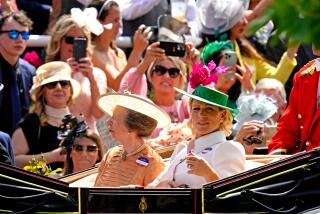Japan Empress, Target of Recent Criticism, Collapses on Her 59th Birthday : Royalty: She regains consciousness but is unable to speak. Doctors blame anemia and fatigue.
- Share via
TOKYO — Japan’s Empress Michiko, under stress from a barrage of negative articles and a hectic year that included the wedding of her eldest son, collapsed Wednesday on her 59th birthday, the Imperial Palace’s chief court physician reported.
She was not hospitalized and regained consciousness a few hours later but had not regained her speech.
The sudden collapse of Japan’s royal matron occurred at 10:25 a.m. while she was talking with her husband, Emperor Akihito, and their daughter, Princess Nori, at the Imperial Palace. Earlier in the day, she took a morning stroll with the emperor on the palace grounds, but she canceled a news conference appearance Tuesday.
Chief Cabinet Secretary Masayoshi Takemura reported that anemia and fatigue were likely causes for the empress’s collapse. But in the cloistered world of Japan’s Chrysanthemum Throne, straight facts about Royal Family illnesses are not given, and imperial court physicians offered no further explanation.
Reporters, suspecting a stroke, asked about signs of paralysis, but the chief court physician said there were none.
The elegant Michiko, who won the hearts of the public as the first commoner to marry into the imperial family 34 years ago, had reportedly been under extreme stress. She told reporters just before her birthday that she had felt sorrow over the last year for the natural disasters and harsh weather that had brought death, damage and economic hardship to her people.
She also has been under personal attack since July, when several weekly magazines broke the long taboo against criticizing the Royal Family with scathing coverage of Michiko’s supposed domination of palace affairs.
“I have to lend an ear to any criticism to reflect upon myself . . . but I feel a deep sorrow and bewilderment toward reports that are not true,” the empress had said in response to written questions about the media treatment.
Critics have begun to derisively call her the “female emperor,” and palace watchers speculate that a power struggle is under way between the empress and the disgruntled bureaucrats of the Imperial Household Agency, who view her as a threat to their traditional ironclad control of palace affairs.
Michiko and Akihito have, in fact, brought relatively startling changes to the 2,600-year-old Chrysanthemum Throne, the world’s oldest continuous hereditary monarchy. Theirs was not an arranged marriage between the imperial family and one of the five regent noble families that have always supplied marriage partners. It was a simple case of love: Akihito fell for the then-Michiko Shoda, daughter of a wealthy flour miller, when he met her on a tennis court.
After they married, Michiko announced that she wanted to raise her own children rather than have them brought up by ladies-in-waiting. She also had a small kitchen built in their palace living quarters so she could sometimes cook meals for her family.
The palace intrigue began spilling into the open in July, when the Takarajima 30 magazine broke the taboo and published a critical article about Michiko. Since then, several other magazines have picked up the scent.
The basic complaints:
* Emperor Akihito always tells the staff to obtain Michiko’s approval before he makes a decision.
* The empress orders up instant ramen noodles in the middle of the night, since she invites friends to the palace and chats with them until very late.
* Her tennis hobby is too bourgeois.
* She ordered staff to cut back the trees on the palace grounds, which the late Emperor Hirohito loved.
* She and the emperor go out too much. This creates piles of extra laundry for the staff because each time the two step out, they change clothes, including their underwear. “Akasaka Palace has turned into a cleaning shop,” one disgruntled staff member was quoted as saying. Staff members also report “waist pains” from the extra load of ironing.
Petty as some of the complaints may seem, they underscore the tension between a modern imperial family close to the people--which the royal couple is trying to create--and the traditional image of a sacred institution shrouded in mystery that is jealously guarded by old palace hands.
More to Read
Sign up for Essential California
The most important California stories and recommendations in your inbox every morning.
You may occasionally receive promotional content from the Los Angeles Times.














